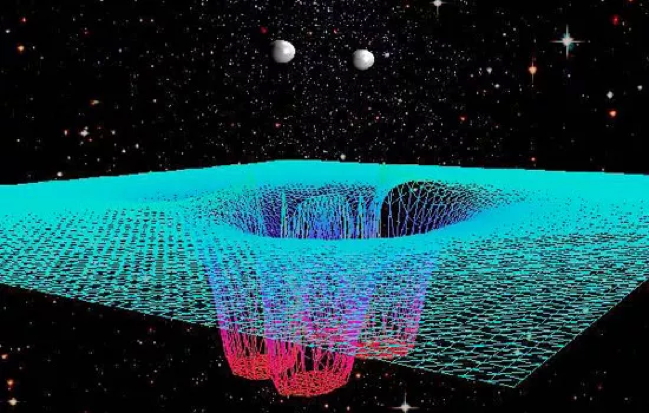
Rochester Institute of Technology scientists produced one of the first computer simulations of gravitational waves arising from colliding black holes. Image released Feb. 11, 2016.
Credit: Campanelli et al.
Scientists made history’s first direct detection of the space-time ripples known as gravitational waves, North Korea launched a satellite and NASA announced its $19 billion budget request for fiscal year 2017. Here are Space.com’s top stories of the week.
At last! Gravitational waves detected directly for first time
In one of the biggest discoveries in the history of space science, scientists have directly detected gravitational waves, the ripples in space-time predicted by Albert Einstein’s famous theory of general relativity in 1916. [Full Story: In Historic First, Einstein’s Gravitational Waves Detected Directly ]
What gravitational waves sound like
This would have blown Albert Einstein’s mind: We now know what ripples in the fabric of space-time sound like. [Full Story: This Is What Gravitational Waves Sound Like (Video) ]
Gravitational-wave detection opens a new window on the universe
The first-ever direct detection of gravitational waves will open up an entirely new window on the universe, researchers say. [Full Story: Gravitational Waves: What Their Discovery Means for Science and Humanity ]
NASA’s $19 billion 2017 budget request unveiled
The Obama Administration’s final budget request, released Feb. 9, offers $19 billion for NASA in fiscal year 2017, a decrease of $300 million from the agency’s final 2016 budget. [Full Story: White House Proposes $19 Billion NASA Budget ]
NASA eyes late 2020s for Europa mission launch
NASA’s highly anticipated mission to the potentially life-supporting Jupiter moon Europa may not get off the ground until the late 2020s, agency officials say. [Full Story: NASA Europa Mission May Not Launch Until Late 2020s ]
Meteorite actually not to blame for Indian man’s death
A report earlier this week suggested that a falling meteorite killed a bus driver and injured three others in the southern Indian state of Tamil Nadu. However, experts have since looked into the matter and cast serious doubt on the initial report from Indian government authorities. [Full Story: Meteorite Did NOT Kill Man in India: Experts ]
Zero-G music video
On Thursday (Feb. 11), OK Go — whose members famously danced on treadmills in the video for their 2005 song “Here It Goes Again” — released the music industry’s first zero-g video. [Full Story: OK Go Releases First Zero-G Music Video ]
Apollo 11 spaceship graffiti
Apollo 11, the first moon landing mission in July 1969, produced a number of iconic quotes, such as, “The Eagle has landed,” and “That’s one small step for (a) man, one giant leap for mankind.” Now, thanks to a surprising discovery by the Smithsonian, history can possibly add “Smelly Waste!” to that list. [Full Story: Apollo 11 Crew Wrote on Moon Ship Walls, Smithsonian 3D Scan Reveals ]
North Korea is at it again
North Korea has apparently launched a satellite to orbit, in a move that the United States and other nations quickly condemned as an attempt to further develop a prohibited long-range missile capability. [Full Story: North Korea Launches Satellite to Space ]
Asteroid impact could lead to mini ice age
A strike by a medium-size asteroid could change Earth’s climate dramatically for a few years, making life difficult for people around the world, a new study suggests. [Full Story: Medium-Size Asteroid Strike Could Unleash a Mini Ice Age ]
Hundreds of hidden galaxies found
A new telescope view has revealed hundreds of galaxies that were previously obscured by the Milky Way’s bulk. [Full Story: Hundreds of Hidden Galaxies Glimpsed Behind Milky Way (Video) ] .
Follow us @Spacedotcom , Facebook or Google+ . Originally published on Space.com .

Comments are closed.